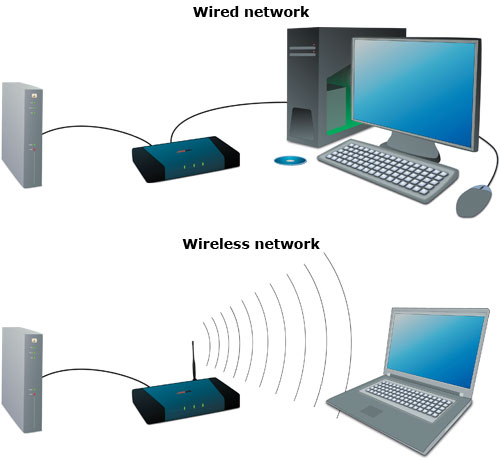Our home networks rely on either wired (Ethernet) or wireless technology. Sometimes, we use both of them, especially when multiple Internet capable devices are set up in homes. Wireless networks enable multiple devices to use the same internet connection remotely, as well as share files and other resources. But it’s still hard to say wireless is better than wired when we talk about wireless network vs wired network, since each one has advantages and drawbacks. This article is meant to make a comparison of wireless network vs wired network from three primary factors: mobility, reliability, and security.

Wireless Network vs. Wired Network

A wired LAN (Local Area Network) uses Ethernet cables to connect computers together directly or more commonly, through a hub, switch, or router. Wired connections typically cost much less and reduce battery drain on laptops and other mobile devices because Wi-Fi adapters use more power.
As for wireless network, users can move around freely within the area of the network with their laptops, handheld devices etc and get an internet connection. The popularity of Wi-Fi has also increased due to increased smartphone and tablet sales. Many of these devices are not capable of wired Ethernet connections and rely on wireless signals for Internet connectivity.
Ethernet-based(wired) networks tend to be much more reliable than wireless networks. The backbone of any network relies on an Ethernet connection. The most common problem with wired network is loose cable connections. Because you have to lay lots of cables and put them through walls etc. A bundle of tangled wires can result in damage and performance degradation. Using Zip-Ties is an excellent cable management way to keep the Ethernet cable out of the way and tangle-free.
For the most part, wireless technology is reliable. There are some concerns about interference from home appliances such as microwaves and cordless phones, but most wireless routers provide multiple channels that can mitigate this concern relatively easily.
The security of a home-based Ethernet network is almost primarily dependent upon a firewall. Most broadband routers include a firewall already and software firewalls can also be installed on individual machines. Unlike wireless networks that broadcast data through the air, all data packets in a wired network safely travel through Ethernet cables. As long as the router is protected from intrusion using a firewall, your wired home network is safe.
The mobility of wireless networks is overshadowed in some respects by the lower security inherent to wireless. An unsecured wireless network can easily be compromised by a hacker or identity thief looking to intercept private information traveling through your wireless network. Although these risks are very real, many of them can be avoided with proper network installation. For example, using a secure password for logging into the wireless network. Although this does not make a wireless router completely safe, it certainly reduces the likelihood of unwanted guests gaining access to your information.
Wireless Network vs Wired Network: Advantages and Disadvantages
| Activity/Category | Wireless Network | Wired Network |
| Freedom of movement for users | Users can access network from anywhere within range | Users location limited by need to use cable and/or connect to a port |
| Sharing Files | Easier with wireless network as you do not need to be cabled to network, though transfer speeds may be slower | Generally less convenient as you have to be cabled in, but transfer speeds often faster |
| Cables | Far less complicated, disruptive, and untidy cabling needed | Lots of cables and ports needed which can be a headache |
| Business | For businesses dealing with public, customers like and often expect wireless, so wireless can increase income | Wired networks are not convenient for public use, but sometimes acceptable for a traditional office |
| Connection speeds | Usually slower than wired | Usually faster than wireless |
| Security | Less secure than wired. Both bandwidth and information can sometimes be accessed | More secure than wireless |
| Set up | Upgrading to a wireless network can be difficult and expensive | Can also be difficult and expensive to set up |
Conclusion
Here, we do not mean to abandon one over the other when wireless network vs wired network. A good home network will often have both wireless and wired components. Ethernet connections are great for high-speed transfers on desktops or other devices that do not move. Your smartphone, tablet, or laptop will benefit from a wireless network that has been properly configured to ensure a secure browsing experience. Whether you choose a wired or wireless network, or a combination of the two, take time to configure it properly and add a firewall to protect your privacy and the integrity of your network while enjoying the benefits afforded by both technologies. If you need any Ethernet cables for wired network, or cost-effective Ethernet switche for wireless network, just give FS.COM a shot. For more information, please visit www.fs.com.
Related Article: How to Get a Wired Home Network With Ethernet Cable?
